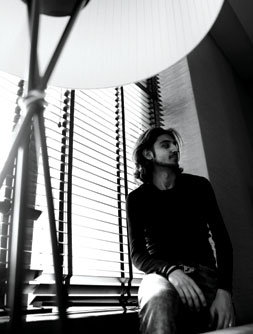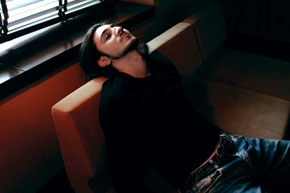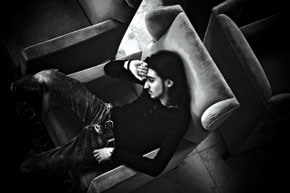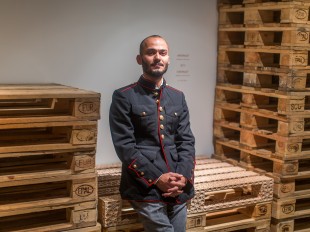 If your image of jazz piano is of deadly earnest, abstract plonking, or some old stager picking out notes in a smoky dive, then you haven’t come across Azerbaijan’s younger generation of musicians; three of them have impressed at the Montreux festival in recent years and are expanding audience perceptions of what jazz can be. These three, Shahin Novrasli, Emil Mammadov and Isfar Sarabski were all proclaimed Honoured Artists of Azerbaijan in December, just recognition of the musical impact they have made.
If your image of jazz piano is of deadly earnest, abstract plonking, or some old stager picking out notes in a smoky dive, then you haven’t come across Azerbaijan’s younger generation of musicians; three of them have impressed at the Montreux festival in recent years and are expanding audience perceptions of what jazz can be. These three, Shahin Novrasli, Emil Mammadov and Isfar Sarabski were all proclaimed Honoured Artists of Azerbaijan in December, just recognition of the musical impact they have made.Isfar, still only 22, may well be the youngest recipient of the honour but no one in the packed audience of his celebratory Jazz Centre concert would argue with the award. A thrilling combination of standards, classical music and his own compositions, with respectful but improvised nods to the pioneering jazz-mugham of Vagif Mustafazade, put a glow in every soul.
We heard that there were new developments in his career and so caught up with him shortly before The European Azerbaijan Society (TEAS) flew him to Brussels to warm chilled European hearts with a performance at the end of January.
Berklee-bound
There was a rehearsal for a women’s comedy evening in progress at the Jazz Centre so the interview adjourned to the Italian café across the road to learn that Isfar was studying English and was soon to depart for an intensive course in the UK. This was a prelude to taking up a course at the Berklee College of Music in Boston, USA, in April.
Some may think that winning the Montreux Jazz Piano Competition (in 2009) would be confirmation of a musician’s ‘arrival’, but there is always more to learn and Isfar was focused:
After Montreux, I wanted Berklee. I have achieved two dreams.
We’ll come to the third dream in a while, but first wondered how difficult it had been to get into the prestigious college. Recordings of his playing sent last summer brought an invitation to go for an audition, part of which required him to play a standard, a blues and one of his own compositions (this time he played Novruz; you can find live versions on Youtube).
At first I thought it would be easy, I had three days to prepare and there was someone with me from the Heydar Aliyev Foundation to organise everything, so I was able to think only about the music…. But I got more nervous as the day approached; there wasn’t a definite programme like at Montreux….On the day, though, I got up at 8 am, which is not so usual (laughing) and was fresh and well-prepared.
The dean gave me a score and half an hour to look at it before playing the music….they played phrases I had to repeat, checking my sense of rhythm. This was unexpected, it wasn’t like a concert, it was an exam….It was difficult – different people, a different country and no one knew me there. They weren’t impressed by Montreux and I had to prove myself…. It was very interesting for me and everything was ok in the end. I didn’t feel any pressure because everyone was sincere, they treated me very well.
 Classical act too
Classical act too There was more to come when Isfar was asked if he played any other kind of music and he answered yes, classical. He played one of Chopin’s Etudes and convinced everyone that he should take on both genres. Thus he has committed himself to a testing two years at Berklee; the daunting prospect was lightened by the news that he would be on a course taught by Danilo Perez – Like a dream come true, he said, to study under the much respected Panamanian pianist. Further encouragement came when the confirmation letter confirmed that a scholarship went with the offer of a place and there could also be help with recordings.
This brought us on to the subject of why we had to rely on less than perfect video clips in between concerts; Isfar has built, over the past couple of years, a concert repertoire of broad range which never fails to ignite audiences, so why no CD yet?
I keep putting it off....it takes time, 3 or 4 months, and I’m too busy....I’m thinking about it, but it has to be a good programme and well-produced....
Given his upcoming schedule, as busy as ever, it looks like we’ll have to wait a while longer, especially as, perhaps to dodge the recording issue, he moved on to a different priority:
I would like to play a solo concert of my own compositions with an orchestra – music that is close to me, something new, different music.
Again, will there be time to organise this in Baku, before leaving for Boston? It’s tempting to demand too much of artists who excite.
The talk of tantalising possibilities had to give way and we returned to basics; as Isfar is now committed to studying classical music as well as jazz, did they demand a different approach?
For me it is all music, I have the same feelings when I play classical and jazz. There is a difference, because with jazz you improvise. With classical music you play what is written and you must have respect for the composer, but you still play your own interpretation. Jazz is freer, more relaxed, but it is also written.
 Swan’s new way
Swan’s new way This inevitably led on to Isfar’s rendition of Swan Lake, which he begins by playing what is gently written but then moves onto a flight path somewhat different to Tchaikovsky’s; accompanied by Russian drummer Alexander Mashin, the journey frequently whips up a stormy passage of energy and driving rhythm.
I was at home watching a performance of Swan Lake on television and the idea came of playing with the rhythms, changing them and adding something. It’s a wonderful work and everybody knows it. Perhaps with this different interpretation I can bring an idea of the greatness of the composition to some of the youth.
Improvisations on Bach’s Air on the G String and medleys of jazz pioneer Vagif Mustafazade’s compositions are also pleasurable as much for the respectful enjoyment the pianist takes in his predecessors’ work as for the artistry and spirit of his improvised performance.
Inspiration, however, can come to Isfar from less conventional sources. He is rarely without a red and black reminder of his favourite football team, AC Milan, ascribing his devotion to Pippo Inzaghi’s goals and the fact that Italy is important to any classically trained musician, as the home of opera, classical music – and the piano. He smiled when asked whether he’d prefer to play at La Scala or San Siro, but is serious about football’s part in his life:
Some people think it’s just watching people run around after a ball, but it’s a creative game and I get a lot of pleasure from it – pleasure and ideas for composition. The emotions can inspire my music.
 Such pleasure
Such pleasure Composition comes, he says, from associations and at the piano. Although he doesn’t now put in the five or six hours of daily practice that he did in his youth (that is, before he reached the ripe old age of 22) there are still days when he is at the piano longer than that, when he falls back on observation. His composition Déjà Vu came out of a project that photographer Sitara Ibrahimova was working on, but ordinary life can also be the catalyst:
Some things happen in life that don’t seem very important at the time, but they can set off a musical theme….
Once he has worked out the main idea by himself, he takes it to a trio and:
something happens, if you work to a definite purpose, it turns out right.
So far, of course, the end product has been a concert, with any luck recordings are not too far into the future, and we wondered whether this was a nervy or enjoyable experience.
When I have prepared well for a concert, I enjoy it. Sometimes I miss the experience, I need the feelings you get from a concert. It gives me such pleasure when people listen and then applaud. I don’t get nervous now, or worry about making mistakes, and I can relax. I want to show what I can do and I want people to understand the music. I know that not everyone will like jazz – that’s impossible – but I want people to know that I am playing music that I like, playing from my soul….
We also miss those feelings when the gap between concerts is too long and we hope that the Baku audience gets one more injection of the pace, the mood and touch of Isfar Sarabski before he leaves for Berklee. Readers in the Boston area are advised to keep a close eye on concert listings from April onwards.


